#because they represent longing like she’s longing for her child who she thinks is dead
Explore tagged Tumblr posts
Text


Creating a fan design for Chuuya’s mother bc I’m brainrotting and we’re not likely to get any so
Currently trying to resist twirling my hair and kicking my feet while designing her
#I needed to channel Chuuya’s prettiness onto her#because I am a firm believer that Chuuya would have gotten hks attractiveness from his mama#also giving her close to chuuya’s manga colors but then Chuuya’s dad is gonna have more anime chuuya colors so#want them to match both kinds of chuuya palettes#bsd#bungo stray dogs#bungou stray dogs#chuuya nakahara#ALSO#planning to have Camellias in her design#specifically White camellias#because they represent longing like she’s longing for her child who she thinks is dead#wip#art wip
39 notes
·
View notes
Note
U mean U and the others (unholy trinity of Tsaritsa simps) did drag me down a wormhole of oc-ing an existing character with lore and yet still making it adapt to your fic.
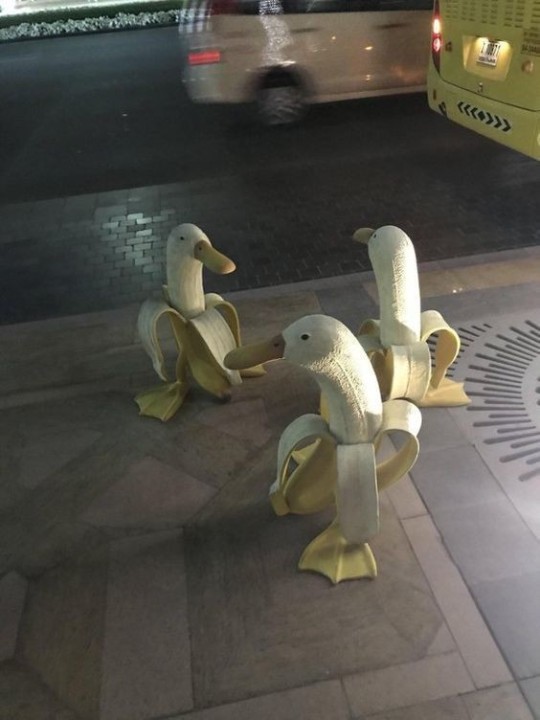
in my defense her lore is extremely vague descriptions by other people (who may be biased. staring directly at childe. staring very hard at childe.) and like. the gem description im just working with what i got. also i don't trust hoyo to write my wife correctly so as far im concerned anything they write abt her isn't canon until i approve it /j
#asks#the-white-void#img block#my tsaritsa is a vague vision in my head i cannot properly articulate and no amount of words can properly explain how much i think abt her#the goddess of love who feels no love for her people just as they feel no love for her.#there is an inherit tragedy in her refusal of the aspect she originally represented because she knows she must#teyvat is simply a tragedy and she is playing her part.#there is simply smth so chefs kiss abt the imagery of a woman so gentle and full of love being so cold#she is gentle at her core but shes had to bury it so deep ppl have already forgotten what that was like. all they remember is the cold#its like. outwardly she looks elegent and gentle. a fitting vessel for a goddess of love#but her eyes are devoid of love. devoid of sympathy. devoid of anything but a cold glare just like the element she embodies.#i need that dead eyed look like childe. absolutely blank.#absolutely deadpan voice. monotone and lifeless just like her nation#I COULD TLAK SM ABT TSARITSA IMAGERY AND THE CONTRAST BETWEEN GODDESS OF LOVE VS CRYO ARCHON IT DRIVES ME NUTS#I'm so normal abt hrr i need 2 be put down ill shut up now#never give me the opportunity to speak abt her i wont stop talking#I'm hitting bones over the head w a rock ITS HER FAULT IF SHE DIDNT WRITE TSARITSA THAT ONE TIME ID BE NORMAL???? /j /lh#i could also talk abt childe + tsaritsa bc they make me feral but this is goingon to long i need 2 be put doen
13 notes
·
View notes
Note
hullo i got what if scenarios and was wonderin if let's say the malfoys are on the light side, and there is a prophecy that draco is the chosen one and lucissa doesn't end up dead in the beginning do you think that lucissa would want draco to be the chosen one and have the fate of the ww on his shoulders? (for this scenario i was simply wonderin how you'll think lucissa and severus will react)
and what if they are actually on the dark side but draco still is a chosen one, how do you think lucissa and severus react and what would they do
Oh man, if the prophecy Dumbledore heard and Snape overheard referred to DRACO? hold on I bet I can rewrite it real quick ~
"The one with the power to vanquish the Dark Lord approaches... born to those who have long aided him, born as the sixth month dawns... and the Dark Lord will mark him as his equal, but he will have power the Dark Lord knows not... and either must die at the hand of the other for neither can live while the other survives...
Severus immediately knows this talking about the Malfoys' kid (Narcissa is still pregnant.) He tells Narcissa and Lucius.
There is absolutely no debate or discussion. If either Draco or Voldemort has to die, they're going to protect Draco with everything they've got.
Lucius calls his Gringotts representative. Tell him to liquidate everything and move as much money as possible into off-sea accounts, like, yesterday.
Narcissa, heavily pregnant, grabs the Diary and Severus and takes them both straight to Dumbledore. She's not going to to be happy until one (preferably both) of them make an Unbreakable Vow to protect her unborn child.
Narcissa says she's relocating to St Mungos, using her pregnancy as an excuse. Really, she's locking herself down under the Fidelius Charm. Lucius is secret keeper. She decides to stay in of of Mad-Eye Moody's safehouses. He can stick around as a body-guard.
Lucius goes straight to Barty Crouch Senior, who is kinda running the show at this point. Actually, because he's good at people, Lucius makes sure he tells his story while Crouch's much more sympathetic wife is in the room too. He starts with, "I know what your son's been doing, but he's not in too deep, not yet. Do exactly what I say, and we can get him out."
Severus stays with Voldemort as an inside man. He does his spy thing, and feeds info to Lucius and the Ministry + Dumbledore and the Order. They start co-ordinating efforts. Death Eaters start dropping like flies.
Voldemort realizes the Malfoys took the Diary with them when they defected. Flies around checking on all the other horcruxes like he does in Book 6. Realizes that the Locket is also gone - and reads Regulus' taunting letter about how he took it and is about to to destroy it. Voldemort retrieves the cup and the the ring, and takes them back to base to protect. Severus relays this information, and now Dumbledore is 100% sure that Voldemort is using multiple horcruxes.
Severus poisons a bunch of Death Eaters (including himself, to avoid suspicion) and frames Bellatrix. After all, she's the link here. Her sister and her cousin both defected, and at about the same time too. The incidents can't be unrelated, it must be coming from her. Might not she be feeding information to her cousin, Sirius Black? If Severus is able to steal Hufflepuff's cup and replace it with a forgery, that would absolutely seal her fate.
Voldemort freaks out, kills Bellatrix. Severus is out of there in the chaos, and he's got the real cup.
He tells his story back at base. Sirius realizes that if Regulus told anyone what he did with the real Locket, it would have been Kreacher. Kreacher just straight up *has* it. Dumbledore brings the Cup, Diary, and Locket out to the hut-on-the-rock, and blasts the whole thing with fiendfyre from the air.
Down to just the Ring and the Diadem (but he can't *get* to the diadem.) Voldemort is panicking. I think at this point he just runs - kills any Death Eaters that are left alive because they know too much.
... with the possible exception of Barty Jr. He's useful, he's a true believer, and he's the only one powered-down Voldemort *really* trusts in Book 4. I think Voldemort does something creepy though, like tell Barty Jr. to cut off his own arm so he can replace it with one of those loyalty-enforcing silver arms, like he did with Wormtail.
Voldemort and Barty are probably making plans to run and hide: Maybe track down Flamel and the Philosopher's Stone, maybe track down the Resurrection Stone. This is made harder by the fact that Lucius Malfoy froze all the Death Eater bank accounts, but I think they manage.
BUT Dumbledore lures Voldemort into the Hall of Prophecy, and uses the prophecy about the newborn Draco to get Voldemort out into the open. He can absolutely still do this even if he's made an unbreakable vow to protect Draco - his reasoning goes that by forcing Voldemort's hand now, when he's weak, it's actually much safer for Draco than waiting until he's built up his power base again.
Voldemort starts to become obsessed with Draco. Everything started going wrong once *Draco* became a thing. He sends Barty to safety with the ring, and goes to find Lucius.
Lucius gives up the location of the house where Narcissa and Draco are - but it's a trap. The Order and the Ministry are there waiting for him, and Narcissa and Draco are long gone. Sadly, I don't think Lucius makes it out of this one. I don't see a world where Voldemort doesn't kill him. But, since he did go to his death willingly and didn't *have* to die - that's Lily's love protection magic, protecting Draco.
Barty Crouch Senior sends the entire might of the Ministry after his son, and I do think is able to track him down and retrieve the Ring. I think Barty jr is captured and is going to go to Azkaban... when the silver hand kills him, preventing him from revealing any of Voldemort's secrets. The Ring is destroyed and Crouch comes out of this with his political career intact, and probably becomes Minister of Magic.
Draco grows up absolutely aware that he is the Chosen One, and is absolutely insufferable about it. Eventually does come across Ravenclaw's diadem (the final horcrux) while attempting to fix the Vanishing cabinet because he and Harry are trying to sneak into Knockturn Alley. Writes to tell his mother that Professor Quirrell is walking around with a very suspicious limp and a very ugly turban. Also something is killing the unicorns in the forrest, and maybe Mr. Potter and Mr. Black should check it out.
57 notes
·
View notes
Text
I think the addition of Tsuwabuki to the plot line of RGU is genius, BUT especially so linking him narratively with Nanami.
Something about... depicting a child who wants to be a prince to protect princesses (the narrative male gender role) with initialy good intentions; and taking that and making him end up looking up to Touga (and everything he represents; The Student Prince) .
Already showing the seeds of the instrumentalisation of his role as a man when stalking Nanami in an extremely creepy way and manipulating her to get on her good graces, even if it DOES put her in danger.
Something about growing up and feeling the despair of seeing the boys you care about in your life (who already had privilege over you as a girl, even if they didn't know how to fully exploit) turn into mysoginistic men...
Seeing this kid who at the very start you think: "well he's still just a child, maybe he won't be like the other men, maybe he'll just be a sweet boy so that Nanami gets some character development and nothing more, a one-episode character and then realize that...no. It's not that he's different from the others, it's that he has yet to be like them.
In Ohtori, Tsuwabuki is a "kid". Really, all of them are. But the show makes a very clear separation between kids before adolescence and teenagers. What's interesting is that, in Utena, the designs of everyone who is at least a teenager support the narrative theme of the adultification they suffer, which is clearer with the younger girls. Nanami and Tsuwabuki have a 3 year age gap, the same as her and her brother. This allows us to really see the disparity between their desires.
Nanami "loves" his brother because she has been brought up to believe that he is to be idolised, the he is HER prince.
Touga wishes to become A Prince (not an Ideal Prince like Dios, for his behaviour clearly tells otherwise; after all, he is following the steps of the "Captured Prince" but that's a story for another day).
And then there's Tsuwabuki, whose core desire is... becoming an adult.
But adults are complicated, especially in Ohtori, for they don't really exist. Ohtori is a corrupted Neverland where its Peter Pan is an adult only when compared to all the children that surround him. For can someone really be considered an adult when they willfully remain inside their own man-made eggshell. Choosing death –for only those who are dead lose any ability to grow up– so long as he remains in control. A chick growing inside their coffin, with no desire to see the outside world. The most childish desire of them all.
But kids look up to their older peers. It's only natural.
AGAIN we see this idea of boys becoming oppressive and learning to use their privilege kinda reprised (or rather, Nanami being once more the reflection) with Dios/Akio and Anthy and Akio and Touga.
How "The prince" ends up manifesting in all boys and men in Ohtori, how his ghost(s) haunt those men both dead and alive. Younger and older men alike...
215 notes
·
View notes
Text
One thing I've noticed with John describing stuff is that the past, he just described Arthur's surroundings because it was necessary. Now, he takes moments to describe things not because he has to, but because they're beautiful, like the trees swaying in the breeze or the sun setting. He's really come to appreciate the beauty around him and he wants to point that out when he can.
lol John being like "Nah, let's keep Yorrick in the bag longer." I always laugh at shit like this.
Arthur, why did you change the subject when John asked who your first real friend was, what happened?
Listening to John and Arthur picking each other up, encouraging the other to keep going, assuring each other that they're going to make it even if tons of other Johns and Arthurs have failed before, aaaagh, I love seeing my boys supporting each other.
Malam's voice is so good, I love it. It's so quiet and it makes you want to lean in so you can catch every word.
I'm fucking crying, oh my God, Malam asking "A man kills his child, does he deserve to die?" and my stomach just dropped. And then it's just this back and forth between him and Arthur, all the while pretty much asking if Arthur thinks he deserves to die because of what happened to Faroe. And for so long, Arthur believes he deserved to, but now, he finally doesn't.
FUCK FUCK FUCK I'M CRYING FAROE HAS ALWAYS BEEN WITH HIM, SHE'S BEEN HERE EVERY TIME HE LIGHTS A TORCH OR LIGHTS THE LIGHTER OR MAKES A FIRE I'M FUCKING SOBBING, AAAAAAAAAAAAAA

There's gotta be some kind of meaning in that Faroe drowned, but now she's represented by fire, by light.
Mother Darkness is following them, oh great. One more thing to worry about. Malam took the words right out of my mouth: her catching up to Arthur isn't a matter of if at this point, but when, we know it's gonna happen eventually. John's little "Fuck" kind of sums it up nicely. Interesting though that her and Malam are kind of like two sides of the same coin. She finds children while they're alive and infects them to do her bidding, while Malam finds them while they're dead to help them and bring them peace.
God damn it Yorrick, don't be a bitch now, I like you!
And with that, I'm all caught up on Malevolent. God, this series has been a fucking ride. It's terrifying and thrilling and sad and emotional and funny. I'm recommending this to everyone I know.
45 notes
·
View notes
Text
I’ve finally recovered from the latest episode of Malevolent enough to actually try to analyze it. It got very long and that’s not even all I wanted to say.
Malevolent 45 spoilers under the cut
First of all shoutout to Harlan Guthrie for making me cry. Was not expecting that tonight but I can’t even be mad about it because the storytelling was so good.
Second of all, the themes. Where do I even start?
As soon as they started talking about the Boy Brigade I knew things were going to take an interesting turn. As John and Arthur both point out, we rarely hear about Arthur’s childhood. He rarely thinks about it. It was a very difficult time for him and to an extent he treats it as if it’s best left forgotten. While it was a difficult time for him and it sounds like he has complicated feelings about much of what they were trying to teach him, it was where he made his first friend. That’s a good memory for him, and it always will be. In that and in other little moments there, he said he found hope.
Hope is a large part of this podcast and the entire point of this episode. When Arthur feels apathetic and discouraged by a lack of meaning, John reminds him that they can make their own and Arthur remarks that he feels hopeful. When Malam explains what he does, he says that children represent hope in this world. Hope is what he saw in the fire and what drew him in.
Personally, I’m seeing connections to season 4 when Arthur referred to John as a child. He meant it in the sense that John didn’t have the same emotional maturity as someone who spent decades living as a human, but it also works in the sense that John is so very hopeful. For all the horrors he’s witnessed, he hasn’t let them beat him down. Even when Arthur dies, he doesn’t stop fighting until he rewrites the narrative to bring his friend back to life. He still refuses to accept that Arthur will (probably) have to die eventually. And when Arthur brings up the admittedly good point that they could be on a fool’s errand, John argues that others might have failed, but they wouldn’t. It’s a simplistic, almost childish argument with no real logic behind it, but it worked. It was exactly what Arthur needed to hear.
Even though the fire had been lit for some time, Malam only appeared when Arthur had been cheered up while he was in the middle of talking about a point in his childhood where he found hope. I’m sure Faroe was a part of what led Malam to that fire, but Arthur’s newfound determination seemed to be the main lure.
And, of course, there’s Faroe. We know Malam can and has killed people in service of children. He did not harm Arthur. He simply spoke with him, granting him information and peace of mind. Faroe didn’t seem angry or resentful. She seems to be sticking around of her own free will. She believes in Arthur so much that Malam took notice and helped her help her father. Even after death, her belief in him empowered him to keep going in a tangible way.
If children represent hope, Faroe’s renewed presence has a double meaning. When she died, Arthur’s hope died along with her. All throughout the story, it was an accepted fact that she was dead and gone. Arthur had been without hope for a long time by that point. At least, he thought he had been. But even though Faroe was gone, she was with Arthur the whole time. Even if he couldn’t hear it or feel it, the hope was always there. The hope will always be there.
#malevolent#malevolent podcast#malevolent 45#arthur lester malevolent#faroe malevolent#malevolent analysis
47 notes
·
View notes
Text
youtube
“What is it that the child has to teach? The child naively believes that everything should be fair and everyone should be honest, that only good should prevail, that everyone should have what they want and there should be no pain or sadness The child believes the world should be perfect and is outraged to discover it is not. And the child is right.”
WOO! After a little over a month and 60+ hours of drawing, it's finally finished. The Peony animatic I promised you has, at long last, arrived.
It took a lot of work, but I'm super happy with how it came out! And, tbh, I'm already planning more animatics I want to do in the future.
I think the majority of you are already acquainted with Peony, but just in case you aren't, here's a quick rundown of her story, or at least what's covered in the video:
Peony has always known her family experienced quite a bit of strife before her birth, but she doesn’t quite understand the full extent of it until getting caught up in a horrible accident. After nearly losing her life, the young magician develops an affinity for Soul magic— more specifically a connection with the spirit plane, and thanks to that, she’s able to meet two very special people. Her deceased granddad and her father’s long-gone ex-best friend are far from perfect people, but Peony quickly warms up to them anyways. She can see they were dealt an unfair hand in life, and that the tragedies they were involved with weren’t necessarily their fault. As she sees it, they deserve a second chance. So that’s exactly what she’s going to give them! Peony resolves to find a way to bring her dead loved ones back to life… developing her powers more and more along the way and providing her family some much needed closure. But is something like resurrection really possible? It seems Peony may be flying too close to the sun. A certain fluttering fiend is keeping an eye on her, telling her it won’t allow her to disrupt the natural order of things, and that one can’t undo what has already been done. But Peony? She doesn’t know how to listen. The young girl will stop at nothing until she saves her two guardian angels and sets her family right.
...She's a stubborn little goober, that's for sure.
I love her, though, I really do, and I hope you love her too. This video was a real passion project, and I'm super happy with how it came out. I'm glad I could get it finished just before the round 3 polls of the OC Tourney start.
Remember, everyone! Peony for president. Girl's already ready to throw hands with a god.
@kirbyoctournament
Some of my favorite frames will be under the cut with annotations/interesting details pointed out.
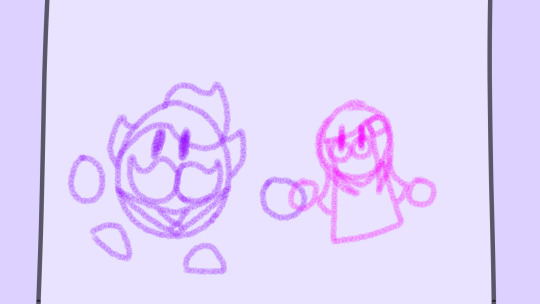
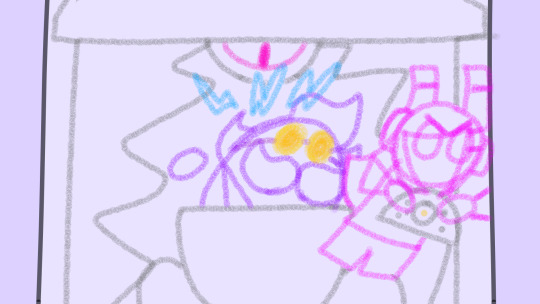
I really enjoyed the crayon drawing aspect of this video. The doodles were super fun to do and added a lot of character to it!
One may have noticed that the way Peony drew her mother's side of the family changed, though, as she told their story... and that's not just to represent them getting older! The way she drew their eyes and other stuff changed because during the later half she depicts them with their cybernetics, whereas during the beginning of their tale, she doesn't. Pretty cool stuff.
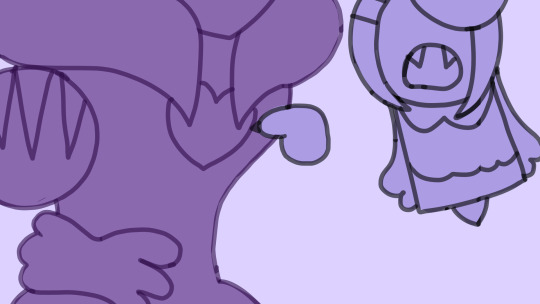
Technically, in Peony's story, she can't really touch/physically interact with the ghosts... at least not at the point in the timeline this part of the animatic takes place during. All the same, though, I decided to fudge it just a little for more interesting character interactions.
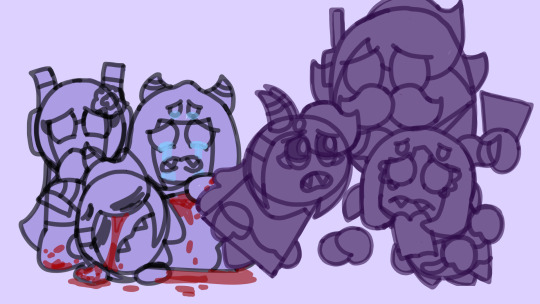
This frame depicts Peony's near death experience, LOL. Don't worry about it... she's fine in the end. In general, this segment of the animatic displays her story a little more chronologically, showing how she developed her powers, learned who the ghosts were, and got better and better at using aforementioned powers.
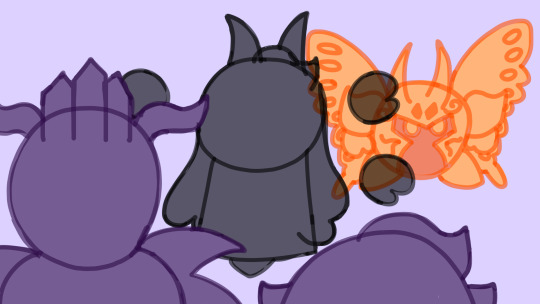
Shortly after Peony's near-death-experience, Morpho Knight tried to reap Sectonia and Haltmann for interfering with the living world and helping save her life. However, Peony, even not knowing who they were at the time, stood up for them- offering up her life, instead, and Morpho Knight, impressed by the display of bravery, allowed it to slide for now.
...Stars, it's going soft, isn't it? Stupid Kirby
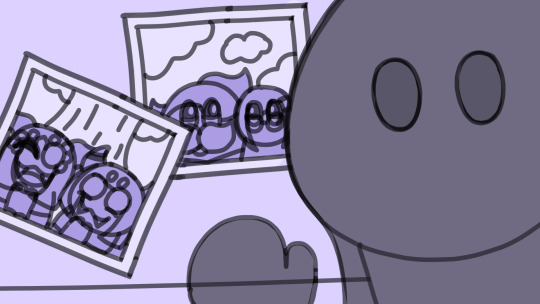
Peony doing some detective work! I really like the framing of this drawing. Here you can see Taranza and Joronia when they were younger alongside Haltmann and Susie pre-cybernetics, like I mentioned earlier.
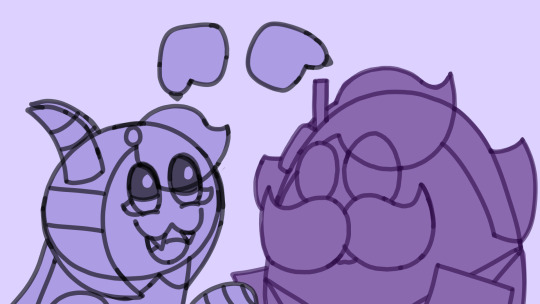
This bit is meant to be Peony finally confronting the ghosts (or- well, more specifically her granddad) about knowing who they are. She points out that she and him HAVE to be related. Look! They share the same hair fwoof!
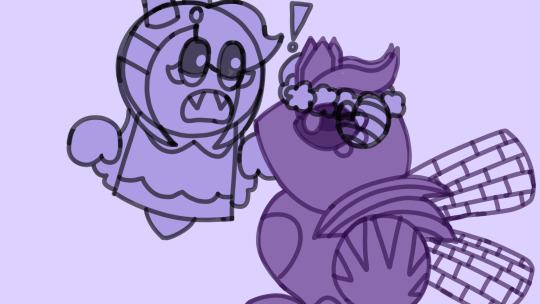
There's a very distinct scene I have in my mind for the first time Peony is ever able to physically interact with the ghosts. She's making flower crowns and jokingly tries to put one on Sectonia's head, only for it to work. Needless to say, they're both shocked, then delighted.
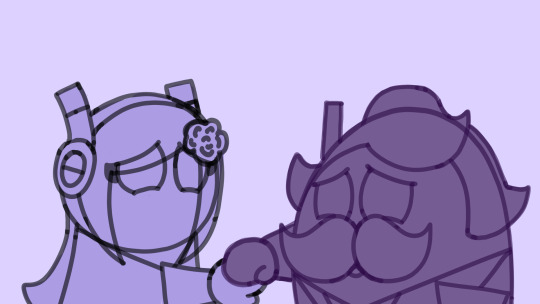
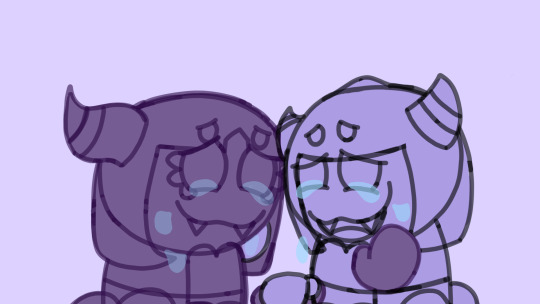
These reunions make me feel things. Admittedly stuff is still a little complicated between Susie and her father, but ultimately she is glad to see him... and as for the spiders? I think they missed each other more than they could possibly put into words. They're so, so happy.
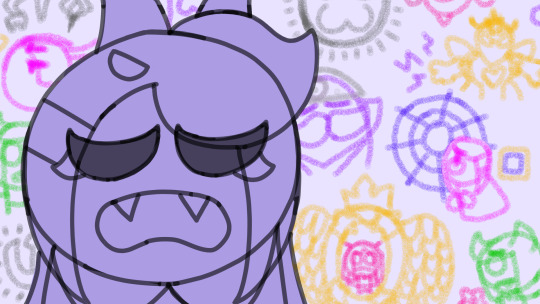
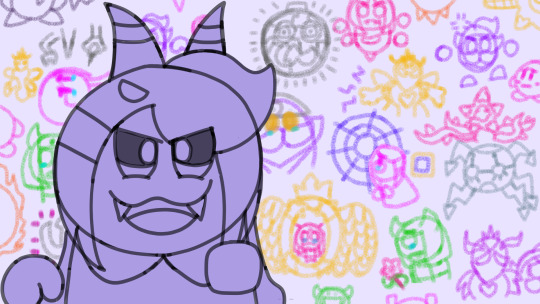
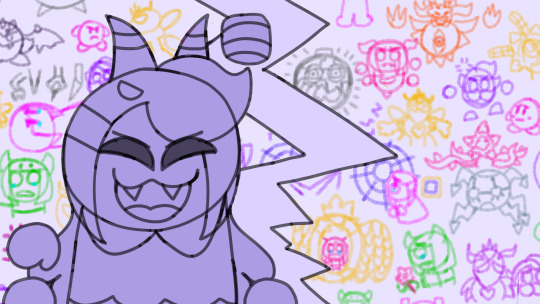
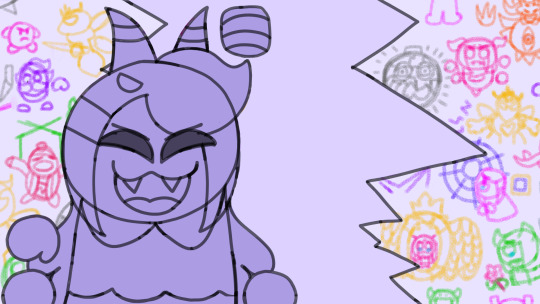
This is one of my favorite sets of frames. It took FOREVER to do all of the little doodles, but it turned out looking awesome, as did the ripping effect! See if you can spot all of the different family traumas she's depicted.
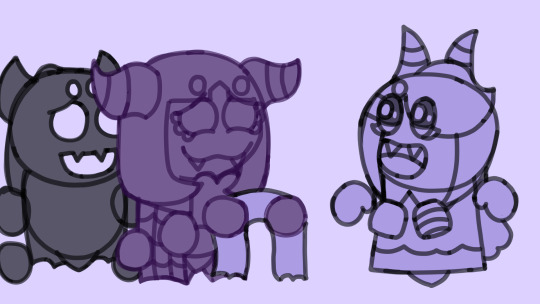
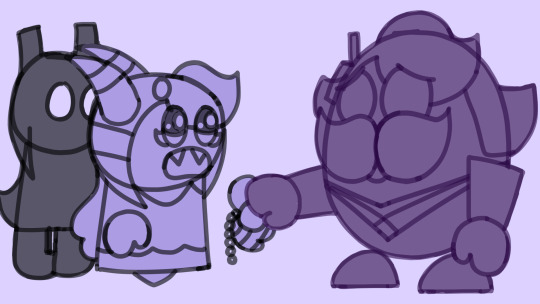
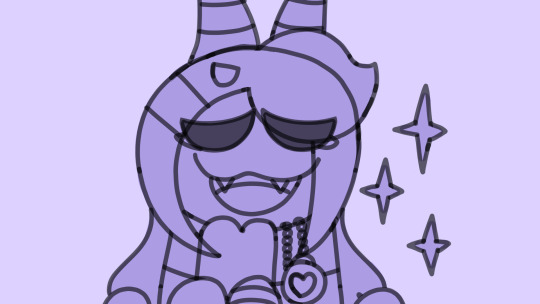
I like to think eventually Peony acquires some precious heirlooms. Sectonia hands down the matching scarf she had with Taranza but discarded when she went mad. Haltmann, meanwhile, no longer has his pocket watch, but when Peony tries to surprise him with a new one as a gift, only to realize he can't really hold onto it, he tells her to take care of it for him 'until he can.' This is something she does with pride.
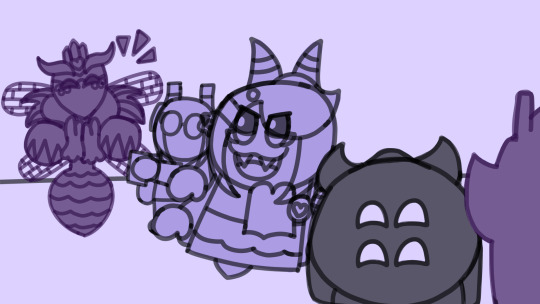
Originally, I wasn't quite sure what I wanted to do with these sets of frames. I mean... I knew I wanted to have Peony walking past her family thriving, but I didn't know how I wanted to orient the group. I figured they'd be best in sets of two, but wasn't sure how to sort them out.
If I were to draw her parents with their dead loved ones, I feared I'd sort of be insinuating their bond with each other wasn't as important now that they had those dead loved ones back, and that isn't true at all. But if I were to draw the living characters and dead characters together... well, that wouldn't really represent how Peony changed the family, now would it?
Ultimately, I decided to draw Susie hanging out with Sectonia and Taranza talking with Haltmann. I thought it'd be a nice way to represent the group as a whole have become a ragtag sort of family. Everyone loves everyone here.
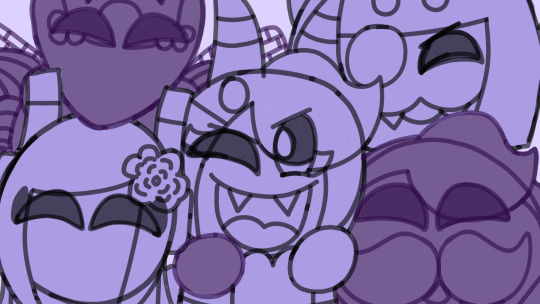
This is one of my favorite frames. I simply think it's so cute. Peony is so, so beloved, and she loves her weird little family so much, too.
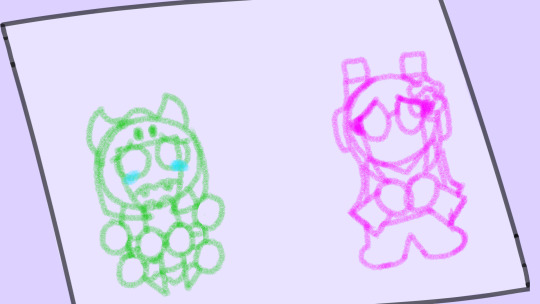
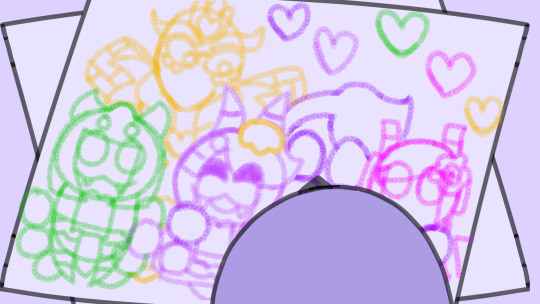
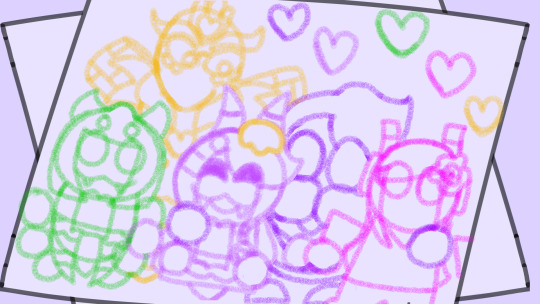
I adore these final three frames. Throughout the animatic, the crayon drawings are used to represent her family's tumultuous past, but finally, Peony depicts a more positive moment, quite literally slapping it over a sad one. It's a symbol of her determination to rewrite their— rewrite her— story, no matter what it takes.
Little does she know, even if she ultimately can't bring Sectonia and Haltmann back from the dead, she's already given both them and her parents a happier ending. They're all together, at least, and that's what matters most.
#kirby oc tournament#peony haltmann#kirby#kirby of the stars#hoshii no kaabii#hoshii no kirby#kirby oc#taranza#susie#susie haltmann#susanna patrya haltmann#sectonia#queen sectonia#max profitt haltmann#sorry ya'll this is going in the main tags. i poured over 60 hours into this
54 notes
·
View notes
Text
Clover Rants Miraculously: Thee Other 1%
I think this has been complained about before, but it honestly does kind of come off super extremely tonedeaf when the show starts moralizing about rich people being "evil" and how success corrupts people (especially egregious in season 5) when their main soapboxers for this argument to represent the "poor 99%" are...
Girl who's parents own the most popular and profitable bakery in the city (that's constantly getting commissioned for catering jobs by the wealthy and famous of the city), has a world-famous chef for an uncle, who's grandmother has enough cash to fund trips around the world and expensive gifts for her (no shade to Gina, biker GILF is valid and can do whatever she likes with her ex-husband's alimony checks), and is favored by famous rockstar + 2 world renowned fashion icons (one of whom was willing to fund a trip for her to New York for an apprenticeship). Like Maribug, I love you, but seriously...
Boy who's a world famous fashion model, who's father owns a (self-made) fashion empire that spans the globe, who's mother was a (claimed-to-be but the show refused to expand on this) famous actress and former noblewoman from the British aristocracy, and spent his childhood being taught by (very likely expensive) tutors paid for by his parents
Girl who's mother is the head chef for a extremely popular and long-running hotel-line (Alya sweetie I love you too, but...)
Set of twins who's mother is a former rockstar who may or may not still get royalty checks from her old producer (and maybe child support from her own ex(no shade to Anarka either you get that bag girl!))
Boy who's late father was a weapon's manufacturer (and a rather lucrative one at that) and noblewoman mother is the heir apparent to their household (mostly due to her twin being disappeared and then dead)
Girl who's mother is the owner of a huge tech conglomerate on par with Apple
Girl who is the affair child between the previously mentioned fashion icon and an never-seen business man, who spent a majority of her childhood at a (implied to be) super expensive bordering school
Corrupt (now former) mayor who has changed gears to corrupt movie director and still owns his expensive and profitable hotel chain
Classmates of the first mentioned girl who's parents include a famous mime actor, director of the Louve, and an astronaut (we're never shown/told what everyone else's parents do but I'm certain they're on similar paygrade levels)
A man who's screentime involves emotionally abusing his son, mistreating magical animals in his care, and humiliating children and his own adult friends for his own ends
Like, if it was an argument about "class solidarity doesn't exist between the elites because they constantly change/raise standards even among themselves", they might of had a point to make, but it's always just "Rich people are all inhuman monsters (except the ones that give us stuff, you guys are cool)"
58 notes
·
View notes
Text
I have a few jumbled thoughts about the ending of the Long Night, especially as it would relate to the whole idea of “the dragon has three heads”. The Long Night represents a disruption in a larger, cyclical framework—a period where imbalance overtakes the natural order. And within this context, I see each ‘head’ of the three-headed dragon as uniquely responsible for restoring balance and bringing the world back into harmony. Each ‘head’ embodies a distinct facet of restoring balance to the world, yet they work together, either in tandem or sequentially, to set things right once more. So I’ve been trying to tie together some thoughts I have regarding what each being in this triumvirate is uniquely suited to do. Because I personally don’t think any one person will be responsible for being the hero, as that just seems so antithetical to this series; and I also think the Long Night is just way too multifaceted to be ended by a singular action or person.
This is what we know about the Long Night:
“Oh, my sweet summer child,” Old Nan said quietly, “what do you know of fear? Fear is for the winter, my little lord, when the snows fall a hundred feet deep and the ice wind comes howling out of the north.Fear is for the long night, when the sun hides its face for years at a time, and little children are born and live and die all in darkness while the direwolves grow gaunt and hungry, and the white walkers move through the woods.” “You mean the Others,” Bran said querulously. “The Others,” Old Nan agreed. “Thousands and thousands of years ago, a winter fell that was cold and hard and endless beyond all memory of man. There came a night that lasted a generation, and kings shivered and died in their castles even as the swineherds in their hovels. Women smothered their children rather than see them starve, and cried, and felt their tears freeze on their cheeks.” Her voice and her needles fell silent, and she glanced up at Bran with pale, filmy eyes and asked, “So, child. This is the sort of story you like?” “Well,” Bran said reluctantly, “yes, only …” Old Nan nodded. “In that darkness, the Others came for the first time,” she said as her needles went click click click. “They were cold things, dead things, that hated iron and fire and the touch of the sun, and every creature with hot blood in its veins. They swept over holdfasts and cities and kingdoms, felled heroes and armies by the score, riding their pale dead horses and leading hosts of the slain. All the swords of men could not stay their advance, and even maidens and suckling babes found no pity in them. They hunted the maids through frozen forests, and fed their dead servants on the flesh of human children.” (Bran IV, AGoT)
We focus so heavily on the Others—understandably so—that we often overlook some crucial details. The Others don’t exist in isolation. They arrive in the wake of an extreme winter, which enables their existence for they are “demons made of snow and ice and cold” (Samwell V, ASoS). And with the sun and its heat gone, they move within the darkness. So confronting the Others in battle, in and of itself, does not end the Long Night. The true struggle lies in addressing the elements that allow them to exist in the first place. To fully defeat the Others, our heroes must first restore light and the balance of the seasons.
No single character in this series has the ability to achieve this on their own. Even the key magical protagonists are only equipped to address certain aspects of the conflict. That’s why the dragon must have three heads, each embodying a crucial responsibility: one to restore the natural cycle and end the long winter, another uniquely positioned as the antithesis to the Others, and a third tasked with confronting darkness by bringing light back into the world.
By now, you can see where I’m heading with this, right? I believe the three heads are Bran, who represents summer and stands as the antithesis to winter; Daenerys, whose dragons are the direct counter to the Others; and Jon, who occupies a more complex role as both the one who harnesses light and embodies it. Beyond this, each of these characters has been positioned as a chosen one, with distinct yet mirrored magical destinies that set them apart from the other POV characters.
I’m reminded of a quote from Arya’s POV in Dance:
One time, the girl remembered, the Sailor’s Wife had walked her rounds with her and told her tales of the city’s stranger gods. “That is the house of the Great Shepherd. Three-headed Trios has that tower with three turrets. The first head devours the dying, and the reborn emerge from the third. I don’t know what the middle head’s supposed to do….”
While I have more detailed thoughts on this passage, for now, I believe Daenerys represents the first head, Bran the third, and Jon the middle. Each head is tasked with a unique responsibility—one that is specific to them, that the others cannot fulfill. To end the Long Night, the three heads work together, but each plays a distinct part. There is some overlap, particularly with the middle head, who might serve as the balance between the extremes, yet each figure is positioned to occupy a particular space within this framework.
So I want to lay my thoughts here and see if we can get some wider discussion 👀
The first aspect of the Long Night - and perhaps the most important if we’re thinking of what makes it happen in the first place - is the long winter that precedes it.
Bran looked down. There was nothing below him now but snow and cold and death, a frozen wasteland… (Bran III, AGoT)
This winter provides the very elements that sustain the Others: snow and ice. It’s this aspect that I believe extends humanity’s struggle during the Long Night. With an almost endless supply of ice and snow, can our heroes truly defeat the Others through direct combat alone? I really don’t think so. The abundance of snow, accompanied by a persistent cold, suggests that new Others can continuously be ‘created’. While this is largely speculative given how little we know about them, I find it compelling that the Others seem to materialize out of the darkness itself (see Prologue, AGoT). And when Sam kills the Other in Storm, it simply dissolves…
Sam rolled onto his side, eyes wide as the Other shrank and puddled, dissolving away. In twenty heartbeats its flesh was gone, swirling away in a fine white mist. Beneath were bones like milkglass, pale and shiny, and they were melting too.
And that might not mean much in and of itself, but I’m inclined to think of the ADWD prologue:
The white world turned and fell away. For a moment it was as if he were inside the weirwood, gazing out through carved red eyes as a dying man twitched feebly on the ground and a madwoman danced blind and bloody underneath the moon, weeping red tears and ripping at her clothes. Then both were gone and he was rising, melting, his spirit borne on some cold wind. He was in the snow and in the clouds, he was a sparrow, a squirrel, an oak. A horned owl flew silently between his trees, hunting a hare; Varamyr was inside the owl, inside the hare, inside the trees. Deep below the frozen ground, earthworms burrowed blindly in the dark, and he was them as well. I am the wood, and everything that’s in it, he thought, exulting. A hundred ravens took to the air, cawing as they felt him pass. A great elk trumpeted, unsettling the children clinging to his back. A sleeping direwolf raised his head to snarl at empty air.
The Other and the human skinchanger dissolving after “death” is so fascinating. And it raises many questions. Death wasn’t the end for Varamyr as his spirit went into his wolf. So is that the same with the Other who also dissolved into white air? As long as magic and suitable conditions (i.e., winter and all its elements) exist, then the Others can never truly die and thus could take on another form?
If that’s the case, then winter itself must be addressed to cut off the Others’ vital resources—along with the magic that sustains them, though we’ll get to that later. And who better to combat winter if not Bran Stark of “Winter-fell”?
Now you know, the crow whispered as it sat on his shoulder. Now you know why you must live. “Why?” Bran said, not understanding, falling, falling. Because winter is coming. […] Bran touched his forehead, between his eyes. The place where the crow had pecked him was still burning, but there was nothing there, no blood, no wound. He felt weak and dizzy. He tried to get out of bed, but nothing happened. And then there was movement beside the bed, and something landed lightly on his legs. He felt nothing. A pair of yellow eyes looked into his own, shining like the sun. The window was open and it was cold in the room, but the warmth that came off the wolf enfolded him like a hot bath. His pup, Bran realized … or was it? He was so big now. He reached out to pet him, his hand trembling like a leaf. When his brother Robb burst into the room, breathless from his dash up the tower steps, the direwolf was licking Bran’s face. Bran looked up calmly. “His name is Summer,” he said.
Bran’s wolf, a reflection of his own identity, only receives his name after Bran glimpses his magical destiny. With winter’s horrors looming, Bran must become the summer that rises to challenge it.
As the Prince of Winterfell, Bran’s title and inheritance—rooted in the Stark legacy from the first Long Night and Bran the Builder—signify a dominance over winter. He is the summer prince, heir to the place where “winter fell, defeated”.
“And who is Summer?” Jojen prompted. “My direwolf.” He smiled. “Prince of the green.”
Prince. The man-sound came into his head suddenly, yet he could feel the rightness of it. Prince of the green, prince of the wolfswood. He was strong and swift and fierce, and all that lived in the good green world went in fear of him. (Bran I, ASoS)
Because winter brings death to the land, summer is needed to restore warmth, vitality, and breathe life back into the world. And that’s why Bran’s identity not just as the “prince of the green”, but as the last of the greenseers (of course once Bloodraven kicks the bucket) puts him in a unique position during the Long Night.
He will be the one to end the winter.
I’m still piecing together what this might ultimately look like, as we need more information about greenseeing and how Bran may fully harness it. However, from what we do know, it seems greenseeing is extends to earth magic—shaping and manipulating the natural world, as seen with events like the Hammer of the Waters. Additionally, greenseers can perceive past, present, and future, which essentially aligns with the passage of time. And isn’t that what the cyclical nature of the seasons embodies? Time flows, and with it come physical changes in the land: winter brings barrenness, spring rebirth, and summer growth. Humanity needs someone who understands this cycle and possesses the power to influence the earth itself.
Since Bran has already glimpsed the heart of winter, it’s possible he will find himself returning there, perhaps retracing the steps of the last hero. Additionally, the Isle of Faces and the God’s Eye, rich with weirwoods and sacred significance, seem like fitting locations for him to play a pivotal role in restoring balance; especially when we consider his role as a Fisher King/Grail figure who is linked with the renewal of once barren land. Whether Bran has to dig deep into the earth’s roots or manipulate the flow of time itself, the Long Night cannot end without his dominance over winter.
However, while restoring the balance of the seasons is crucial, neutralizing the immediate threat posed by the Others and their thralls is extremely important- and that’s where Dany comes in!
That night she dreamt that she was Rhaegar, riding to the Trident. But she was mounted on a dragon, not a horse. When she saw the Usurper’s rebel host across the river they were armored all in ice, but she bathed them in dragonfire and they melted away like dew and turned the Trident into a torrent. Some small part of her knew that she was dreaming, but another part exulted. This is how it was meant to be. (Dany III, ASoS)
I’ve argued before that, of our three chosen ones, Dany is the best suited to take on the role of military commander—and I don’t think that’s a far-fetched claim. She has one of the cleanest and most impressive military records in the main series, proving herself a formidable tactician. Not to mention, she commands the dragons—living embodiments of fire—who have been positioned as the direct counter to the Others, creatures of ice. While the Others bring cold and death, Dany and her dragons are fire made flesh, a force of life and renewal.
There are other narrative arguments for why Dany’s role is going to be so heavily militaristic.
Until one day Prince Rhaegar found something in his scrolls that changed him. No one knows what it might have been, only that the boy suddenly appeared early one morning in the yard as the knights were donning their steel. He walked up to Ser Willem Darry, the master-at-arms, and said, ‘I will require sword and armor. It seems I must be a warrior.’” (Dany I, ASoS)
“No one ever looked for a girl,” he said. “It was a prince that was promised, not a princess. Rhaegar, I thought … the smoke was from the fire that devoured Summerhall on the day of his birth, the salt from the tears shed for those who died. He shared my belief when he was young, but later he became persuaded that it was his own son who fulfilled the prophecy, for a comet had been seen above King’s Landing on the night Aegon was conceived, and Rhaegar was certain the bleeding star had to be a comet. What fools we were, who thought ourselves so wise! The error crept in from the translation. Dragons are neither male nor female, Barth saw the truth of that, but now one and now the other, as changeable as flame. The language misled us all for a thousand years. Daenerys is the one, born amidst salt and smoke. The dragons prove it.” (Samwell IV, AFFC)
“Azor Ahai, beloved of R’hllor! The Warrior of Light, the Son of Fire! Come forth […]” (Davos I, ACoK)
Azor Ahai is said to be a warrior, and while Dany doesn’t fit the traditional image of what that means, she is still an active participant in warfare. Moreover, one of the central aspects of her character is her role as an agent of freedom:
“…this Mother of Dragons, this Breaker of Chains, is above all a rescuer.” (Tyrion VI, ADWD)
She has spent much of her arc directly combating slavery which might seem unrelated, but the Others come with their own type of bondage in their creations of undead. The slavery of the Others is not just physical, but spiritual, and Dany’s role in battling them aligns with her fight for freedom. She isn’t suited to combat winter itself, as Bran is, but her strength lies in physical battle, which Bran is not. To put it another way: if Bran is Frodo journeying into the depths of Mordor, Dany is Aragorn, turning Sauron’s eye with her dragons and leading the fight to defeat his armies.
But I don’t think her role ends there.
The Others are not dead. They are strange, beautiful… think, oh… the Sidhe made of ice, something like that… a different sort of life… inhuman, elegant, dangerous. SSM
I’ve already mentioned that beyond the elements of winter—snow, ice, and cold—the Others are sustained by magic. Building on the idea of the Other dissolving into mist, it’s possible that magic is what binds these beings together: magic fuses a consciousness with snow and ice into a corporeal entity. So, in addition to battling them physically, our heroes—and Dany in particular—may have to confront this magic that gives the Others their form and power.
“Half a year gone, that man could scarcely wake fire from dragonglass. He had some small skill with powders and wildfire, sufficient to entrance a crowd while his cutpurses did their work. He could walk across hot coals and make burning roses bloom in the air, but he could no more aspire to climb the fiery ladder than a common fisherman could hope to catch a kraken in his nets.” Dany looked uneasily at where the ladder had stood. Even the smoke was gone now, and the crowd was breaking up, each man going about his business. In a moment more than a few would find their purses flat and empty. “And now?” “And now his powers grow, Khaleesi. And you are the cause of it.” “Me?” She laughed. “How could that be?” The woman stepped closer and lay two fingers on Dany’s wrist. “You are the Mother of Dragons, are you not?” (Dany III, ACoK)
The birth of Dany’s dragons seems to have strengthened fire magic, tying her deeply to the very fabric of magic itself. The AGoT bookend suggests that the Others’ ice magic and the dragons’ fire magic may be connected, part of a larger magical ecosystem, or perhaps opposing forces that coexist on opposite ends of the spectrum. Ice and fire, death and life—both seem bound by the same mystical forces. Given Dany’s connection to magic and the fact that the reemergence of her dragons parallels the resurgence of the Others, she seems best suited to combat the magic that enables the Others to take form—serving as an inverse to her bringing dragons to life. And this underscores her dual role as both a destroyer and creator of life
The specifics on Dany’s confrontation with the Others and the magic that creates them remains unclear. She could venture to the heart of winter/the Lands of Always Winter and face the source of their power, creating narrative symmetry between the dragons of the Lands of the Long Summer and the creatures from the Lands of Always Winter. Alternatively, she might find herself in the Isle of Faces if her dream of fighting the Others at the Trident is fulfilled literally. The Isle, with its rich magical ecosystem, would be a fitting place for such a climax.
Bran, too, seems destined to go to the Isle of Faces (I’m a firm ‘Bran, King at the Gods Eye’ truther). This could be where their paths cross and their roles intersect. Bran, with his deep connection to nature and time, might provide Dany with guidance on how to engage with magic and influence its effects on the world. With Bran’s knowledge and Dany’s firepower, she could then deliver the final blow. While much of this remains speculative, what is clear is that their roles complement each other.
And that leaves Jon, the “light bringer”.
They said the words together, as the last light faded in the west and grey day became black night. “Hear my words, and bear witness to my vow,” they recited, their voices filling the twilit grove. “Night gathers, and now my watch begins. It shall not end until my death. I shall take no wife, hold no lands, father no children. I shall wear no crowns and win no glory. I shall live and die at my post. I am the sword in the darkness. I am the watcher on the walls. I am the fire that burns against the cold, the light that brings the dawn, the horn that wakes the sleepers, the shield that guards the realms of men. I pledge my life and honor to the Night’s Watch, for this night and all the nights to come.” (Jon VI, AGoT)
It’s important to see Jon’s primary function as an extension of his current role. He is a man who watches for the night—a sentinel standing against the encroaching darkness. This role is deeply embedded in his identity, and it’s fascinating to see how it manifests in his prophetic dreams.
It’s black inside, and I can see the steps spiraling down. Somehow I know I have to go down there, but I don't want to. I'm afraid of what might be waiting for me. The old Kings of Winter are down there, sitting on their thrones with stone wolves at their feet and iron swords across their laps, but it's not them I'm afraid of. I scream that I'm not a Stark, that this isn't my place, but it's no good, I have to go anyway, so I start down, feeling the walls as I descend, with no torch to light the way. It gets darker and darker, until I want to scream." He stopped, frowning, embarrassed. "That's when I always wake." (Jon IV,AGoT)
Last night he had dreamed the Winterfell dream again. He was wandering the empty castle, searching for his father, descending into the crypts. Only this time the dream had gone further than before. In the dark he'd heard the scrape of stone on stone. When he turned he saw that the vaults were opening, one after the other. As the dead kings came stumbling from their cold black graves, Jon had woken in pitch-dark, his heart hammering. (Jon VII, AGoT)
The Winterfell crypt dreams contain many intriguing elements, but I’ll focus primarily on two key motifs: death and darkness.
Jon is the most natural fit for the middle head of the dragon because he exists at the intersection of extremes: light and darkness, destruction and renewal, death and life.
When the spirit stepped out of the open tomb, pale white and moaning for blood, Sansa ran shrieking for the stairs, and Bran wrapped himself around Robb’s leg, sobbing. Arya stood her ground and gave the spirit a punch. It was only Jon, covered with flour. “You stupid,” she told him, “you scared the baby,” but Jon and Robb just laughed and laughed, and pretty soon Bran and Arya were laughing too. (Arya IV, AGoT)
While Bran is connected to summer and warmth through his magical familiar, Jon possesses a unique sensitivity to death, embodied by his bond with Ghost.
He sniffed at the bark, smelled wolf and tree and boy, but behind that there were other scents, the rich brown smell of warm earth and the hard grey smell of stone and something else, something terrible. Death, he knew. He was smelling death. He cringed back, his hair bristling, and bared his fangs. Don't be afraid, I like it in the dark. No one can see you, but you can see them. But first you have to open your eyes. See? Like this. And the tree reached down and touched him. (Jon VII, ACoK)
Furthermore, Jon’s fate at the end of ADWD implies that through his death and eventual rebirth, he becomes a ghost in his own right—caught between life and death, existing yet not fully alive. This intertwines with his connection to darkness, as Jon straddles the boundary between light and darkness: a shadow.
All in black, he was a shadow among shadows, dark of hair, long of face, grey of eye. (Jon VII, ACoK)
“I can show you.” Melisandre draped one slender arm over Ghost, and the direwolf licked her face. “The Lord of Light in his wisdom made us male and female, two parts of a greater whole. In our joining there is power. Power to make life. Power to make light. Power to cast shadows.” “Shadows.” The world seemed darker when he said it. “Every man who walks the earth casts a shadow on the world. Some are thin and weak, others long and dark. You should look behind you, Lord Snow. The moon has kissed you and etched your shadow upon the ice twenty feet tall.” Jon glanced over his shoulder. The shadow was there, just as she had said, etched in moonlight against the Wall. (Jon VI, ADWD)
Shadows, like ghosts, are echoes of something once tangible. They arise from obstructed light, existing in a realm that is neither completely dark nor wholly bright, hovering between presence and absence. They highlight where light is absent. But shadows also exist only in the presence of light, revealing the delicate boundary between illumination and the lack thereof.
So building on that idea, it’s significant that Jon’s frequent journeys into the Stark underworld, where death and darkness prevail, take a pivotal turn in ASoS when he becomes vividly aware of light fading in real time.
He dreamt he was back in Winterfell, limping past the stone kings on their thrones. Their grey granite eyes turned to follow him as he passed, and their grey granite fingers tightened on the hilts of the rusted swords upon their laps. You are no Stark, he could hear them mutter, in heavy granite voices. There is no place for you here. Go away. He walked deeper into the darkness. "Father?" he called. "Bran? Rickon?" No one answered. A chill wind was blowing on his neck. "Uncle?" he called. "Uncle Benjen? Father? Please, Father, help me." Up above he heard drums. They are feasting in the Great Hall, but I am not welcome there. I am no Stark, and this is not my place. His crutch slipped and he fell to his knees. The crypts were growing darker. A light has gone out somewhere. "Ygritte?" he whispered. "Forgive me. Please." But it was only a direwolf, grey and ghastly, spotted with blood, his golden eyes shining sadly through the dark…
This is particularly noteworthy because of a similar, parallel dreams:
That night he dreamed of the feast Ned Stark had thrown when King Robert came to Winterfell. The hall rang with music and laughter, though the cold winds were rising outside. At first it was all wine and roast meat, and Theon was making japes and eyeing the serving girls and having himself a fine time . . . until he noticed that the room was growing darker. The music did not seem so jolly then; he heard discords and strange silences, and notes that hung in the air bleeding. Suddenly the wine turned bitter in his mouth, and when he looked up from his cup he saw that he was dining with the dead. (Theon V, ACoK)
The fires that ran along the blade were guttering out, and Jaime remembered what Cersei had said. No. Terror closed a hand about his throat. Then his sword went dark, and only Brienne’s burned, as the ghosts came rushing in. (Jaime VI, ASoS)
The ASoS crypt dream runs parallel to Theon’s ACoK dream and Jaime’s ASoS dream, with a common element: the presence of death and growing darkness.
While the crypts are inherently dark, Jon perceives when other sources of light are extinguished—true to his role in the Night’s Watch, which is to keep vigil against encroaching darkness. This ability to sense the fading light underscores his ghostly nature, where he reflects light while simultaneously existing in a state of absence. It also highlights his role as a shadow, existing in the blending of light and darkness. As both a shadow and a ghost, he can navigate these dual states, acting within the world’s transitions between day and night.
Which brings us to what I consider a continuation of Jon VII; while that chapter is marked by a lack of light, this next chapter is characterized by an abundance of it:
Burning shafts hissed upward, trailing tongues of fire. Scarecrow brothers tumbled down, black cloaks ablaze. ‘Snow,’ an eagle cried, as foemen scuttled up the ice like spiders. Jon was armored in black ice, but his blade burned red in his fist. As the dead men reached the top of the Wall, he sent them down to die again. He slew a greybeard, a beardless boy, a giant, a gaunt man with filed teeth, and a girl with thick red hair. Too late he recognized Ygritte. She was gone as quick as she’d appeared. The world dissolved into a red mist. (Jon XII, ADWD)
At some point between these two dreams, Jon found (or even created) light and he wields it as a weapon. And it’s clear that Jon’s sword in this dream is the actual manifestation Azor Ahai’s Lightbringer:
“In ancient books of Asshai it is written that there will come a day after a long summer when the stars bleed and the cold breath of darkness falls heavy on the world. In this dread hour, a warrior shall draw from the fire a burning sword. And that sword shall be Lightbringer, the Red Sword of Heroes, and he who clasps it shall be Azor Ahai come again, and the darkness shall flee before him.” (Davos I, ACoK)
Lightbringer has two major requirements: to give off heat and to illuminate. Jon’s sword does both!
We’ve seen a number Lightbringer-esque weapons (e.g., Beric’s and Thoros’), but Stannis Baratheon’s sword is the most intriguing proxy.
Davos knelt, and Stannis drew his longsword. Lightbringer, Melisandre had named it; the red sword of heroes, drawn from the fires where the seven gods were consumed. The room seemed to grow brighter as the blade slid from its scabbard. The steel had a glow to it; now orange, now yellow, now red. The air shimmered around it, and no jewel had ever sparkled so brilliantly. But when Stannis touched it to Davos’s shoulder, it felt no different than any other longsword. “Ser Davos of House Seaworth,” the king said, “are you my true and honest liege man, now and forever?” (Davos IV, ASoS)
While Stannis’ sword is visually dazzling, it is, in essence, a well-made fake. Its bright glow meets one of the two requirements for “light-bringer”, yet its impressive variety of hues with no actual heat serve as a clue that it is not the true sword of heroes. When the world cloaked in darkness, a weapon that shines as brightly as the sun is undoubtedly a powerful symbol. And Stannis’ sword is bright….
….but it’s almost too bright. His sword emits the wrong kind of light—one that is all glamor with little substance. This great conflict is referred to as the “war for the dawn”. So what humanity needs is a reminder of the dawn itself:
As a red dawn broke in the east, Grey Wind began to howl again. (Catelyn X, AGoT)
A swollen red sun hung low against the western hills when the gates of the castle opened. (Catelyn IX, AGoT)
Dawn and the sun are often associated with red hues in the text, a color heavily tied to fire (e.g., House Targaryen and R’hllor). Stannis’ sword gives off light, but it lacks the essence of true warmth. In contrast, Jon’s sword is the real Lightbringer: it is hot enough to burn against the cold and it radiates the actual red hues of dawn, thus illuminating the world around it.
Jon’s role as the archetypal fantasy protagonist necessitates a magic sword—Lightbringer will be his Excalibur; his Anduril. But more than just being a weapon, his Lightbringer symbolizes the transition from darkness to light. Dawn, a moment of transformation, begins with deep red hues that retain the shadows of night before blooming into the full brightness of the sun. Like the early dawn, Jon straddles the line between night and day, existing between life and death, darkness and light. As the middle dragon head, he embodies balance.
I’m not really sure how that plays out in the endgame; hell, I still can’t figure out how Jon will ���forge” Lightbringer in the first place. But he has to end up somewhere for his arc to reach its magical climax. I’ve speculated that Bran and Dany might find themselves at the Isle of Faces or the heart of winter. The latter is a strong possibility for Jon, especially if he too recreates the last hero’s journey; not to mention his connections to snow and winter. But he could also return to the Wall, a mighty structure that symbolizes the boundary between life and death. The Wall is also imbued with ancient magic that radiates outward (e.g., strengthening Mel’s magic and prolonging Maester Aemon’s life). Therefore, it could serve as the ideal location for Jon to reignite and wield the light that has long been hidden.
Though Bran, Jon, and Dany each have distinct roles in restoring balance, their actions are deeply intertwined, with shared themes across their arcs. Jon and Bran connect through their existence in darkness, as seen in their ACoK dreams. All three share connections to death: Bran inhabits the realm of the dead (Mel I, ADWD; Jon’s ACoK wolfdream), Jon embodies a ghost-like nature that straddles life and death, and Dany is called the “bride of fire, daughter of death”. Additionally, Jon and Bran are linked to winter, and both Jon and Dany share the legacy of Azor Ahai and Lightbringer, with dragon breath also echoing the red hues of dawn. Together, they are not just separate forces but three heads of the same dragon, working in concert to ensure that the Long Night ends and the cycle of life and death continues.
TL;DR:
The dragon has three heads, each with a unique role in maintaining the cycle of balance, despite their overlaps in common themes. Bran, the Prince of Winterfell, embodies summer and inherits the legacy of the kings of winter, making him the most suited to confront the Long Night’s origin: winter itself. The Long Night cannot end without Bran’s triumph, as winter represents death while summer signifies new life. Dany, linked to the ebb and flow of magic and the direct antithesis of the Others, is best positioned to engage them in battle and counteract the ice magic that enables their existence. As the perfect manifestation of fire magic, she serves as a powerful weapon, embodying the theme of destruction by being “breaker of chains”. Meanwhile, Jon straddles the boundaries of light and dark, life and death, destruction and creation. His unique position allows him to navigate these extremes, bringing forth the lost light while holding back the consuming darkness. As the embodiment of balance—dead yet alive, icy yet fiery—he ensures the proper equilibrium between these forces.
Dragons, symbols of life, fire, and summer, starkly contrast with the cold death represented by winter and its children. Daenerys, as the Mother of Dragons, embodies the nurturing aspect of life, actively bringing forth new existence by counteracting suspended states of life (e.g., awakening dragon eggs and freeing slaves). Bran, representing youthful vitality, symbolizes young life that is both born and maturing. Jon occupies a unique position in the middle; he is like spring, a new life emerging from darkness, akin to an awakened dragon—life once petrified but now revitalized. Together, these three form a multifaceted dragon that embodies various dimensions of life, each contributing uniquely to the fight against the Long Night.
#yikesssssss this might be the longest post I’ve ever written shajsbsjbshs#have a lot of thoughts so I hope this all made sense despite the length#but I’ve been wanting to write a more detailed post on thematic meaning of ’the dragon has three heads’#asoiaf#valyrianscrolls#jon snow#bran stark#daenerys targaryen#three heads of the dragon#the long night#the others#random speculations
42 notes
·
View notes
Text
I know I have a MILLION other ideas I need to focus on rn, but I really wanted to share this since its been cooking in my mind for a while. I had an idea for some sort of Gods&Monsters AU with Batman and my OCs
(THIS IS A LONG POST, SO CLICK BELOW TO SEE MORE!)
Some of the Lore/Rules I have thought up of it so far:
● Gods/Goddesses are divine, immortal beings that have domain over specific things in the world. They are a power that can be bestowed by any mortal to take the place of the previous god if they so choose said mortal. Though this rarely happens for God's are usually reluctant to give up their domain and immortality.
● People called their "Champions" are blessed by their respected god and can communicate with them and call upon them for their assistance/power. They are people both feared and/or revered depending on who they fight under and when blessed, aquire great strength, durability and magic ability than that of a normal person.
● Gods/Goddesses can only travel to different locations their temples were built at on mortal land. If they have a Champion, though, they can then travel with them and basically go wherever their champion goes in the mortal world.
● Gods/Goddesses all go barefoot, wearing very little accessory on their feet, for their divinity keeps them from touching mortal ground. They can travel to the mortal realm, but they can't be seen by them unless they are their champion or if their champion calls them for power.
● It is possible for a God/Goddess to relinquish their status of godlihood and become human. They can either willingly give their title away OR if they bare a child to a mortal, thus bearing a demigod. However, like before, most gods (especially older ones) are not easily ready to lose their godlihood, so when a God loses their divinity, it is usually seen as disgraceful or sorrowful action for being brought down in such a state. The act of having a demigod child is thought to be the biggest taboo and the surest way to lose all their divinity, so relations between a God and a mortal is not really thought in high regards.
● Monsters and humanoid races exist in this world. Humanoid races who have intelligence can also be candidates as gods.
So my OC's first:
🐇 Eleanor is the Goddess of Childhood and is a fairly popular god among families and children. She watches over all children who request her blessings for protection, good fortune, health, etc. There have been a few cases where some children were able to see her while in her temples, but they lose the sight when they get older. Do not be fooled by her title and appearance, because like a child, she can be just as cruel as one. She is more powerful than some people think and her mood can turn just as badly. Even with that said though, she is a pretty lonely goddess, because she has never had a champion in her name. No one wants to fight for something as fleeting as childhood. Same with her followers, they will all eventually leave once they become adults and got what they wanted from her.
Jervis Tetch is her champion that represents her and can call upon her and her powers for assistance in combat. He was another that was able to see her as a child, but was one that actually stayed with her. A troubled and difficult life is what made him feel safe and wanting to keep coming back to Eleanor for the sense of comfort he never got to have in his life. It was no secret that she was getting attached to the man as well, watching him grow up and see how his life was turning even daresay love?. At Jervis' lowest point, she managed to reveal herself to him and it only solidified, not only their co-dependency, but his devotion and resolve to become her champion, to be something more than what even he thought he could be.
Jonathan Crane is her champion and can call upon her and her powers for assistance in combat. He traveled to the abandoned kingdom of the dead because he planned on stealing Kathys books and knowledge of necromancy, but ended up finding her in her domain and becoming her champion instead. It was an equal exchange sort of deal, where he can get access to her divine powers and her necromancy teachings while she gets to see the outside world and join in on her handsome Champion's sinister endeavors in using the dark occult.
💀 Kathy is the Goddess of the Afterlife and conjurer/watcher of creatures of the undead. She is considered a neutral evil god since death comes for all, no matter who or what they are, but she tends to bend the rules of her domain over the dead. In her mortal life, she secretly practiced forbidden magic in necromancy due to her interest in the god and the beings who can come and go from it. While she meant no harm, she was tried for heresy against her kingdoms faith and messing with conservative ideas of life and death. She was severely punished, but rather than pass on, her soul was given the title by the previous god. When she returned, she wasted no time turning the old kingdom into a graveyard and necromancing the peoples corpses in it.
🦅 Mavis is a fairly newer Goddess of the Skies, basically a "lesser" nature god that domains over the skies and all aviary beings. Mavis is the illegitimate daughter of the previous Sky Goddess and the corrupt ruler of a kingdom that took advantage of the god and her following of the Harpy people. The position of Sky God had been left vacant for a good few years until Mavis came out of hiding and reclaiming the divinity since she was the previous gods child, suprising both gods and mortals thinking that she has been dead. Not a whole lot of gods welcomed her at first for being a demigod and such a new one at that. But part of why she came out now was so that she could finally smite her blood father for all of his crimes against her, her mother, her people, and Oswald.
Oswald used to be the rulers advisor, who originally planned to sabotage and take his place, but then came to befriend the Harpy people and then his motives begun to change when he was aware of the rulers plans. It was realized too late, however, after finding out the ruler took advantage of the Harpy god and was sentenced criminal charges for aiding in the betrayal and for later taking the demigod offspring of the previous Sky Goddess. He became a father to Mavis while living in hiding, and told her everything that happened and how she was the next one in line. Even after years later, Oswald decided for them to return to the harpy people. Oswald had become too injured to be her Champion, but has gained the Harpy's trust again and became one of their many leaders among them, supporting and affirming Mavis' power and domain as he so wanted to do from the beginning.
Other thoughts from Canon characters are:
🦇 Bruce Wayne, of course, is the lone wandering "Dark Knight" who is a demigod born from the God of Medicine and his mortal mother. Being able to travel both planes of existence, he wanders through both lands as his own form of affirming justice and peace among both corrupt mortals and corrupt gods alike.
🃏 Harley is the newly appointed Goddess of Chaos and has been for a few centuries now. The title used to be Jokers and used to be his champion before she got tired of being used badly by him and managed to trick and strip him of it. Joker still roams the mortal realm to this day spreading his own chaos while finding his way into getting back at Harley and overthrowing her to gain the title back again.
🌿 Ivy is obviously the Goddess of Nature and is considered one of the older, major gods of the world. She usually keeps to herself up in the divine plane, but has roots everywhere on earth so she and other gods and see whats going on down there. She is a popular god among many masses, including farmers, hunters and apothecaries since her domain is what makes up most of the world. Though truth be told, even with all the followers, she doesn't seem to care for mortals that much.
🐈⬛ Selina is another lesser, but still important, nature Goddess of the Fauna on land, though its apparent that she favors the feline races. She is a finnicky and trickster god that usually prioritizes her own vices, but still offers her services to her followers, if she so feels like it. She rarely is ever on the divine plane with the other gods and would rather be roaming around in the mortal realm since there are many of her temples spread wide around the world. She and Pamela sometimes clash since Selina usually tricks and brings misfortune to hunters who mean ill will while Pamela blesses good fortune for them.
🪙 Harvey is the God of Law and is a frequently used name among many kingdoms' justice system, be they morally just or corrupt.
❔️Ed is the God of Knowledge and is a prominent figure for both scholars and inventors alike. He has played a hand in many constructions of mazes, puzzles and engineering throughout the centuries. He is someone always hunting to get to the answer first and prides in being two steps ahead of the situation. He is a God that is a bit of a Trickster and likes to play mindtricks, even to his followers (he thinks its only fair that they use their brain).
❄️ Victor is the lonely God of Snow. Nora and used to be his Champion and were both very much in love until she was inflicted by a curse from an opposing God before they defeated them. He keeps her in a divine casing made of his ice to preserve her until he can find a magic strong enough to release her from this curse. He can only go so far with no Champion and very little temples to his name unfortunately.
Aaaaaand that's all I have in this AU so far! I know some characters have more thought in them than others 😭 But I hope you enjoyed my crazy rambling and this world I'm cooking up! I'd definitely like to expand on this sometime since I think there's still so much you can fill in. Again, thanks for listening~ 💙
#dc#batman#batman tas#btas#batman the animated series#batman oc#btas oc#batman tas oc#jervis tetch#mad hatter#jonathan crane#scarecrow#edward nygma#riddler#selina kyle#catwoman#pamela isley#poison ivy#harley quinn#harleen quinzel#victor fries#mr freeze#harvey dent#two face#oswald cobblepot#penguin#bruce wayne
21 notes
·
View notes
Note
What is the backstory of Frankenfoot? Now I'm curious.

The short, spoiler free answer:
I thought it would look cute on her! So, I decided that she lost her foot during the final events of The Dark Urge’s storyline. I think it’s a fitting way to symbolically represent what she lost/gained to overcome her haunted past. And very sweetly, Astarion helped her stitch the corpse foot in place (which I might draw in the future)!
I also just like this dumb joke that she now has “one foot in the grave.”
The longer, Dark Urge plot spoiler heavy answer:
Devlin doesn’t have many scars. As The Dark Urge she was a child of Bhaal and also his most loyal cleric. He granted her power over life and death so she could always cure wounds before any rigid scar could mar her sacred flesh.
It is her bloodkin Orin though who leaves her with the greatest physical scar–the loss of her foot. In the climax of Durge’s story, Orin challenges Devlin to a final duel. Orin transforms into the slayer and immediately chomps Devlin’s foot clean off during this fight. Devlin, in excruciating pain, barely manages to kick Orin’s face in. (As the player, I had to get so creative because OMG ORIN HITS FUCKING HARD IN THIS FIGHT. I barely got by with strategically timed uses of Sanctuary, Hold Monster, Spirit Guardians, and Harm. It was brutal.) Through ingenuity and sheer luck, Devlin buys herself enough time to land the final spell that ultimately ends Orin the Red.
Orin melts into a puddle of her own flesh…and takes Devlin’s foot to the grave with her.
Devlin had little time to process this before Bhaal appeared with his ultimatum. She rejects his offer and is punished by death. Granddaddy Withers shows up and does the ol’ cleave body to soul thing for Devlin, resurrecting her to her almost former glory...sans foot! As a funny note: it's now granddaddy Withers who is lending his divine favor to Devlin but he refuses to answer any of her questions, so she's functionally an agnostic cleric now. Since she was killed by Bhaal after her foot was already lost, it became a permanent feature even upon Withers’ resurrection. But, with her cleric powers still intact, she has the bright idea to franken-foot a replacement! She scoured the temple of Bhaal to find a comparably sized foot (which did not take long, let’s be real). She painstakingly stitched the dead foot on with a little help from the nimble hands of her embroiderer boyfriend. She sealed the suture with her highest level healing spell and used a little necromancy magic to reanimate it! Thanks for the asks! I just posted that line about franken-foot for the lols but I actually appreciate the genuine curiosity from ya'll. 🖤
28 notes
·
View notes
Note
what are your thoughts or opinions about the afterlife in hp? and what do you think about the trope where jily are able to watch down on all the things that are happening to harry and co. in real time?
thank you for the question i think about this a lot!!! i cried writing the end of this lmao.
soooo i do not like the looking down on everyone trope. i've never liked the idea of people just being up in heaven, watching. it sounds like a horribly boring thing to do for eternity, and i think it's a cop out. death is permanent.
i DO have thoughts about the afterlife in hp. they kind of mix with my thoughts about the afterlife in general. i don't believe that when we die a "self" remains in a way that would be recognizable to humans. i like what chidi on the good places says
That’s one conception of death for a Buddhist. The wave returns to the ocean — where it came from, and where it’s supposed to be
and people are the wave. i apply this to hp too, i do not think anyone is sitting around waiting to be called on by the resurrection stone or by a dead-not-dead loved one taking a stop in the afterlife train station.
yet, we see memories of people with knowledge beyond the "creator" of the memory, and to some extent, wills of their own. to me, when the imprints of people appear in the living world, it is a very complex bit of magic that pulls from the past and memory and emotion. we all leave imprints in the places we go and in the people we meet. not even voldemort can run from this.
so, then, the train station.

there is, in Judaism, a concept of being guided by your loved ones to the next phase of the afterlife. in Judaism and Islam there is a concept of soul purification in Gehenna/Jahannam, which is like Hell, wherein the soul experiences the outcomes of all they caused in their life. once they have been purified, they travel onward. this experience for a person who dies and comes back, is obviously thought to be mental, the brain's way of coping with dying.
we see loved ones guide harry on his way to death, and dumbledore says that his conversation with harry is all in his head.
when someone dies in hp, i believe their soul/mind travels to a place of comfort and a place of transition, and they are led on the path to the afterlife by a loved one. once they are there they undergo the purification through a long talk with their loved one. the loved ones aren't waiting around to do this, it's kind of life the wave rises for a moment, but it is not the exact same person.
harry goes to King's Cross bc trains=travel and because this represented his freedom, his journey to his true home.
when james dies, i think his dad is there to guide him on. james had plenty of places of comfort, but perhaps he finds himself walking through a field near the house he grew up in with his father. it's a path he'd taken many times, to walk into town with his friends, to call lily on a payphone, where he rode his broom, where he played as a child. so all parts of his life are there. he works through all of his guilt, the pain of betrayal, mourns, and is at peace.
when lily dies, i think james is there to guide her. he's able to explain everything, even though irl only moments have passed. i'm not sure where they would be, tbh. i think transitions were hard for lily bc she never felt at home in either world. maybe she's on a front porch at the end of a party. about to go home, happy and warm from time spent with friends. it doesn't matter the house. james and lily have a long talk on the front porch, and when they're done, the lights go off, and the party is over, and she is happy and at peace.
when sirius dies, james is there to guide him. they're in the forbidden forest, as in english folklore forests are places in-between, and because this is one of the places sirius was happiest. a time when helping his friends was a complete act of joy, not complicated and hard and sad. james tells sirius that it's okay, that he's suffered enough, and sirius gets to let go of all the pain he'd endured since he was a kid. he is at peace
when remus dies sirius guides him. remus is also in the forbidden forest, since this is one of the few places he was able to feel free (both as wolf and as man) even if there was guilt after. they tell each other they love each other. again, the pain is worked thru until remus is at peace
i want to do peter but it's hard to say. maybe his mother guides him, maybe he's at a place from childhood before everything got so complicated. maybe he's in the forbidden forest, too. if someone we know guided him, i think it would be james or lily. it isn't about what james or lily want, they are at peace, they don't care, and is it even really them? peter will be feeling his pain for a while, but in the end it will be okay. he will get peace, too.
#m#ask#Anonymous#james potter#sirius black#lily evans#remus lupin#peter pettigrew#marauders#text#my hcs#jily#harry potter#hp meta
15 notes
·
View notes
Note
i’ve got a list in my head of moments in spn where i think it would’ve been the perfect moment to bring in a secondary character, and there’s one in particular that i think is just. so, after the rupture, cas meets up with claire. she finds out about jack, she finds out about mary. and yeah idk i just think claire would have a really interesting perspective about it all. about dean. i don’t think she’d be completely on dean’s “side” (i don’t like calling them on diff sides but i think you get what i mean) and yell at cas or guilt him or whatever, nor would i want that(!), but… after all, claire knows what it’s like to care about, to love, people who have hurt her family. 😕

oh this one hurts. this one hurts. you're absolutely right though and my god is this a good fucking take. like. okay so first off this made me realize that jack and claire never met. and while i don't think claire would be like "you stole my dad" (because of course she wouldn't) i think there could be some really really interesting feelings to work through in term of cas having another kid who is dead now, and how hard he's taking it. i think claire would have to initiate this meetup, not cas, because cas is trying to isolate himself and would not want to look at another child he believes he failed.
absolutely 100% agree that there's not really "sides" but i also don't have a better term for it. i think claire would see cas' "side" and could give cas some real comfort, if he was open to it. she knows what it's like to lose people and to feel like you failed. she believes that cas is good, and trying to be better. and she's a living, breathing symbol that not everything he touches goes wrong. i think she could represent healing to cas, and just talking to her could nudge him towards reconciliation.
(side note: i would have liked to see their relationship develop further past season 10. i feel like it was a really promising start and then just. nothing. it felt like once she had jody they were like 'okay she's being parented cas doesn't need to do it anymore!')
i also think claire could easily see and sympathize with dean's "side." her dad abandoned her and her mom was absent from her life for a long time. her mom literally died in her arms. i could see why the pain of losing a parent would resonate with her. i can also see why, if she talked to dean, she would sympathize with feeling abandoned by cas (talking about seasons 4 through 10 here). and last but certainly not least, claire is going through a widow arc of her own. she's still reeling from having lost kaia. while she didn't see dean during his widower arc, jody did, and i'm sure jody mentioned that dean really wasn't doing well. and that might be on claire's mind too - that dean is in serious pain from losing a parent, a child, and a friend who could be something more.
like you said, i don't want claire to yell at or guilt either of them. i'm not sure she would, either. but i think she could sympathize with both of them in a way not many others in their lives could. and i would also like to see her again :)
16 notes
·
View notes
Note
your real honest opinion on David's character. GO!
I feel like this implies I've been trolling everyone for the past 6 years about how much I love this silly lil guy. Is there supposed to be a /j at the end of that, anon??
Bestie I would not put this much effort into a troll ever 😭 like do you think I sat there and made a whole comic series for a funny little gag??
In case this is genuine tho:
LONG READ AHEAD
cuz of course. You give me the chance to talk about David and I'll TALK
My real honest opinion on David
Paradise
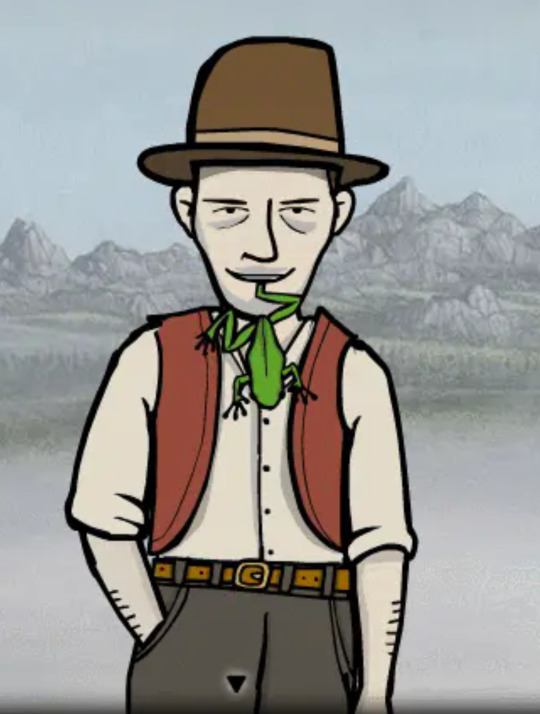
Silly funny fella. Goofy as hell. I think you can read David's attitude multiple different ways in Paradise. To some he comes off as just an asshole
To others he's just a kid being a kid
I personally read his character as somewhat sarcastic and spiteful towards Jakob. His smile? Sarcastic. His "it's been a while brother"? Sarcastic. "I hope I'm not the one who died tonight" while knowing full well it ain't him? Sarcastic.
I'll talk about this more later when I talk about Mr. Rabbit!David.
David has the characteristics of most youngest siblings; He's annoying, he's childish, maybe a little spoiled and needy for attention too.
Not to jump ahead in this analysis and all but in Birthday, the box he needs has text on it that reads "hungry ghost", "ghost who is unable to be reborn" or preta. They're often spirits of people who died full of greed and jealousy. In Japanese, a preta is also "a spoiled child" or "brat"
Based on that information I thought maybe David was jealous of Jakob cuz he wanted to be the golden boy, ya know?
Tldr;
Paradise!David is just a funny lil guy who most likely harbors negative feelings towards Jakob who overshadowed him despite not even being there.
Mr. Rabbit
Who David is now. An older more mature David. Something clicked in his brain and he realized 'okay actually we're all fucked. Peace out guys I'm looking out for myself.'
Brown Rabbit:
I feel like he represents the last bit of David's naivety, innocence, and child-like spirit. The white rabbit (David from the future) sees that rabbit get killed from the window. He can no longer deny what's happening. The child within him he used to retreat to when things got bad is dead. There's only the white rabbit now
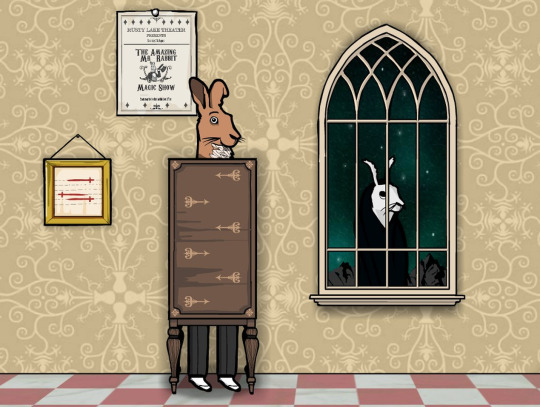
I feel like that's also something represented in David's masks
The older he gets, the more devoid of joy he becomes
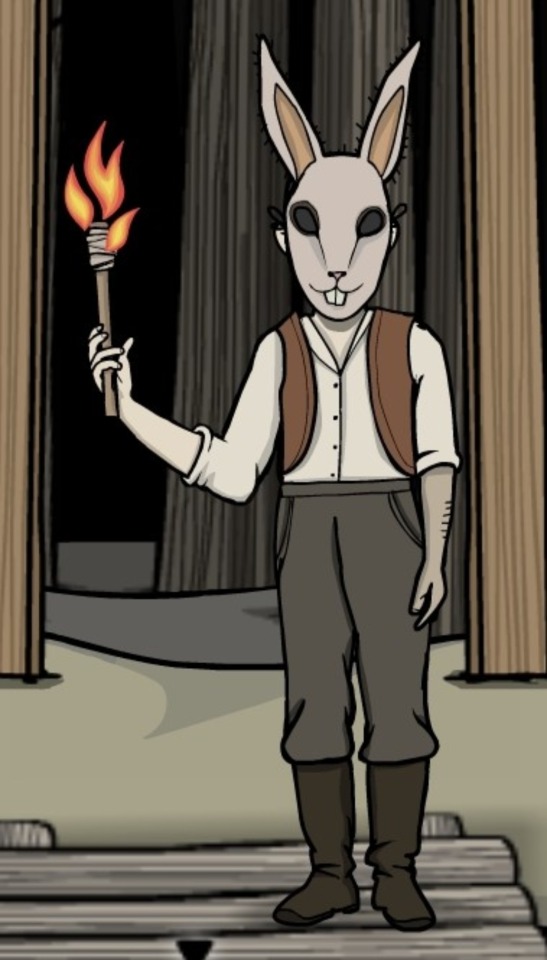

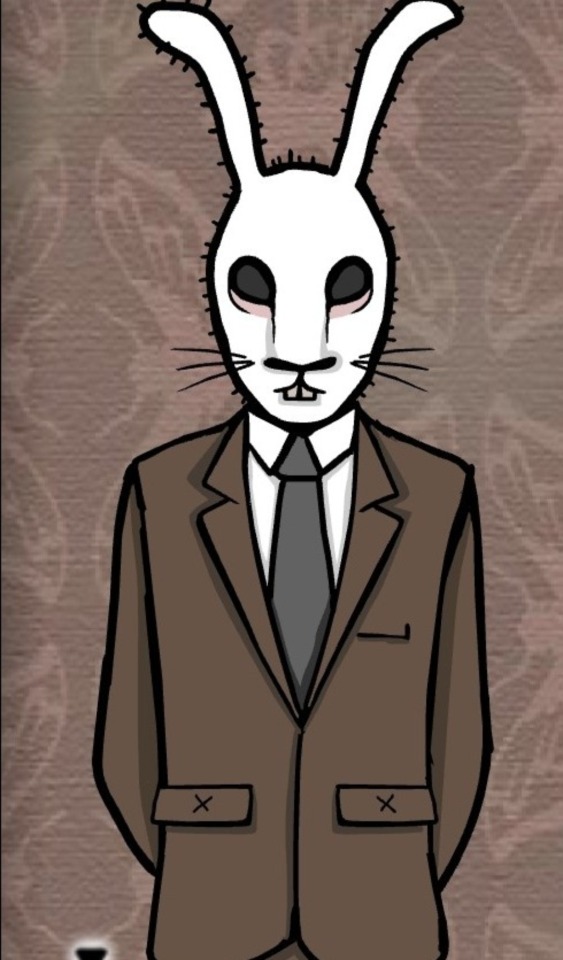
He becomes more and more aware of his situation.
As a child, you have the blessing of ignorance. That's why the world feels like a safer more colorful place to you until you grow up and you can no longer protected and shielded from the world.
To me, I think that's where David's trauma comes from. His ageing and how fast he's had to grow up and become a man, despite his attempts to remain a child.
In paradise, it's likely he was still pretty much "fingers in ears going LALALALALA" with his eyes closed tightly.
Brown rabbit is all that remained of his ignorance, and now it's gone, leaving behind only the White Rabbit. The David that knows and acknowledges the cruelty of his life. A ghost of his former self.
Speaking of:
White Rabbit
What are we but the products of our traumas and life experiences.
The white rabbit, David from the future, is on a journey to save his soul and be reborn. Obviously, the goal of all the corrupted souls. There is a soul we know succeeded in that and was, in fact, reborn. And that soul is Elizabeth.
Elizabeth was the collateral damage in a battle she had no hand in. She is probably the most innocent victim in all of this family feud going on, and I think because of that, Jakob allowed her to be reborn.
Something he did not allow David to do. I think it's safe to say Jakob and David do not like each other. Seems like David's plans clash with Jakob's and so he has to be taken out of the picture, and yet, David always seems like he has tricks up his sleeve.
Somehow, David is able to go back in time to save himself. What happens after that? We don't know yet
You could argue that he failed and died in the blue cube memory of Birthday. Or that he is simply still out there rn waiting for his story to be told. Both are true cuz that's the nature of Rusty Lake.
David seems to be on his own grand journey, stuck in his own Paradox, desperate to find a way to he reborn.
The thing that stands out of course is David's corrupted soul, or rather, the many different forms of it:
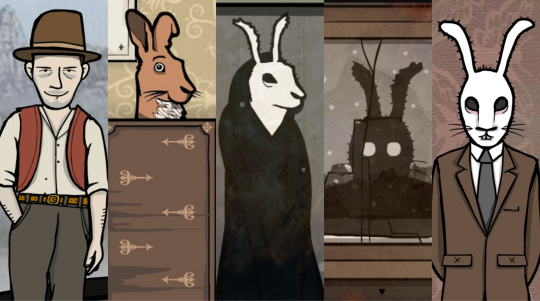
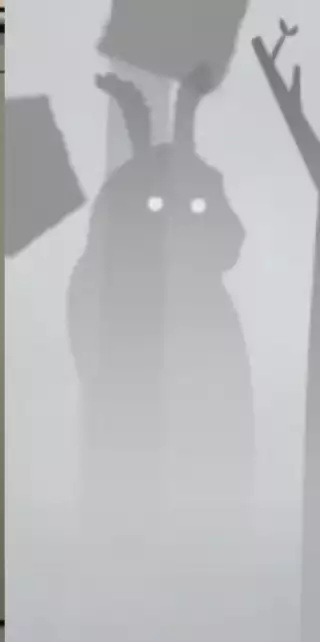
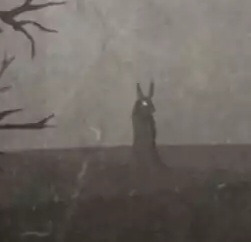
This is probably due to there being multiple different David(s) from the paradoxes he's lived through.
But what is the White Rabbit David if the brown rabbit is David's reborn Asura? Is the white rabbit not his Asura too?
Hard to say. We never seen a corrupted soul take form like David's white rabbit one before, and even more than that, one that retains autonomy. After all, David had enough control over himself to write and leave Dale a letter, meaning he is fully aware of what he is doing. Yet he is prone to violence the way regular corrupted souls are.
It's likely the white rabbit is an advanced form of a corrupted soul, probably the last stages before rebirth.
That or.... Well.... It's just a mask. After all, in Paradox, David spoke with a regular human voice over the phone, meaning he was not a corrupted soul.
In that case tho, if he was already reborn... Why did he say he needed to escape his current "hungry ghost" state?
Obviously Paradox is the most unreliable game narratively cuz you're just going through Dale's jumbled up memories. It's likely he's just recalling an actual conversation he had with David on the phone at the time (which still makes no sense cuz that would mean at the time David was still a human. Or it means he's recalling some conversation he had with David at some point in his life, not necessarily Birthday. OR... That's just a memory the machine is feeding him and it never really happened. Point is, paradox can't be used as a fact for anything)
Timeline is fuuuucked when it comes to David's story so uuuh
We don't know where he is now, what actually happened to him, or wtf is going on with him.
What we do take from his whoooole story tho:
Conclusion
(you did it, chat. You made it this far into my rambly post!!)
David is a really cool and very interesting character that might not appear to be so on the surface. You only really get how complex his character is when you think of everything that has happened in the games. He has a story that is either left for us to piece together or is still not yet fully explored.
To me, David is a character born of defiance and rebelliousness, as well as the need for survival and self-preservation. He is someone who has challenged his own fate, knowing damn well he's up against higher powers, but still taking the chance to save his soul. He is resilient, and stubborn, and just won't accept his fate and die. He has challenged his position in the food chain, a rabbit who is meant to be at the bottom, proving that he should not be underestimated. To me, that's worth loving and admiring. AND IM CHEERING HIM ON! GO DAVID! GO! IM SO PROUD OF YOU MY SON!!
And that's my real honest opinion on David
Thank you for reading.
#asks!#RL: lore and theories#fandom: rusty lake#david eilander#theres so much i have to say about this guy#you have no idea#i have so many thoughts#i wish i could structure this better#like a proper study#but 😭😭😭#hhh i love him sm
24 notes
·
View notes
Text
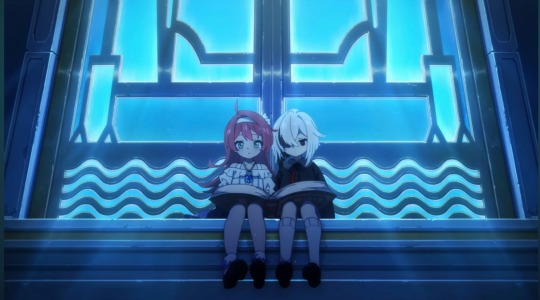
Okay so I slept on it and uhm
I still don’t know what to say about this animated short. Crucabena, the clash, Scaramouche in his oversized jacket
But I think I’ll do the things that definitely stuck out to me and probably seeing things that aren’t there.
1. Crucabena and the Lumidouce Bells
So, when Arlecchino confronts Crucabena she’s in front of two dead or dying Lumidouce bells. She says she should’ve pruned the flower long ago instead of waiting for it to already show signs of decay before finally pruning it. When your prune your flowers you’re trying to control their size and shape, optimize its blooms, and to get rid of any diseased, dead, or dying parts that can’t be saved. However, her plant is already beyond saving since whatever she should’ve pruned to keep the flower alive has already taken over the rest of the flower. So of course these flowers probably represent Arlecchino. How Crucabena should’ve reigned in her child long before she finally rebelled. The choice of flower though is fun, we’ve been told time and time again that this flower is supposed to represent parting and the wish for reunion. This could represent their inevitable parting, but I’m more partial to the idea that the two blooms represent Peruere and Clervie. I mean two Lumidoce bells both dying, flowers that represent parting and the wish for reunion. The 4.6 preview page with her on it, the 4.6 trailer saying Father is looking for someone. Yeah…
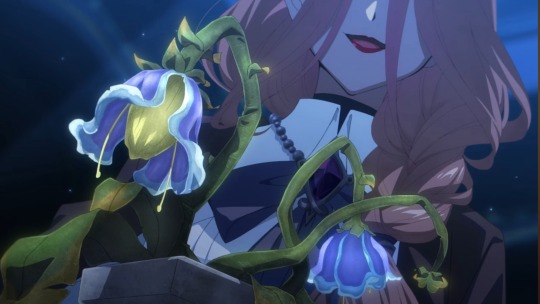
2. The implication of ‘Father’ as a title.
So… using a title that contradicts someone who has caused pain your life because you don’t want to be associated with them ever again and you strive to be better than they ever were. Yeah…
Being serious though, other than the fact that she might not want to be associated with someone like Crucabena, the title Father we already know comes with very different implications, and now that we know Crucabena was called Mother I think I can safely come to the conclusion that the term Father also represents an entirely different role, not just the same role under a different name. After all, in the very end Arlecchino uses the terms ‘strict’ and ‘unfeeling’. Which whilst we know Crucabena was brutal, in the beginning she’s reading them a story book and is overall showing happiness, contentment, and then ‘concern’ over where Peruere was. Her role whilst being someone we should stomp into the dirt was filled with emotion, but that emotion and care is fake. It was only used as a weapon against her, and a weapon against her family. So now, as Father she is hiding whatever she feels probably because she thinks showing how much she cares would only hurt the orphans under her care, especially since if this is the case her feelings and her actions would directly contradict each other and would only confuse the children.
You care about them but you make them do all these horrible things? It’s probably the same dilemma Peruere went through, you care and yet here I am experiencing pain that you caused. On this note, something a little smaller…
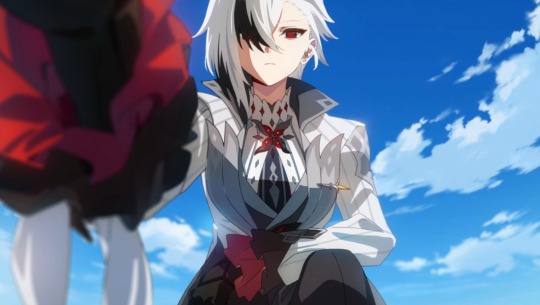
3. Peruere becoming Arlecchino.
This will be shorter as there’s not much to say, but she was arrested clearly when they found out she killed Crucabena, a harbinger. However then the Tsaritsa pardons her crimes and takes her into the Fatui. Now, this is important to me because I think we can conclude that Peruere didn’t want to become a harbinger, that wasn’t her goal, she didn’t want to become the exact same person Crucabena was and now here she is getting bestowed her title and I can only assume her name too. Just as Pierro says “This title and its legacy of bloodshed are now yours to bear, my poor, mad, cursed Knave.” The only thing I can say is this was certainly the beginning of the end for our poor Knave.
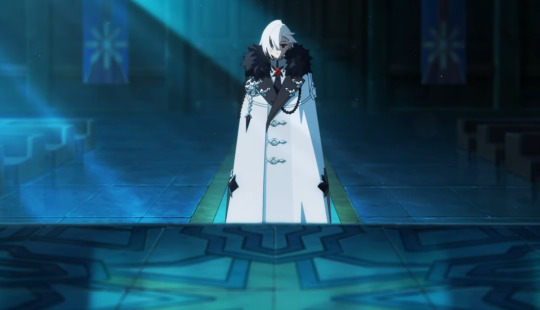
I have more but I lost most of it
Either way I hope Freminet calls Arlecchino out on how she’s starting to behave like Crucabena in a few ways. Let my man scream, he deserves it bro.
36 notes
·
View notes
Text
We Live in Time: Review
A good British rom-com? It’s about time

Try as you might, it’s tough to think of the last truly great, weepy British rom-com (or any for that matter). For every About Time, which came close to greatness, there’s a Last Christmas, which failed to marry up its British sensibilities with a story people would remember. But for anyone who worries that we might be in a post rom-com era, fear not. We Live in Time delivers laughs, tears and heart-warming revelations in abundance, propelled by two British acting talents at the top of their game.
In a narrative that loops back and forth in time, we follow the love story of Almut (Florence Pugh), a chef and restaurant owner, and Tobias, a recently divorced Weetabix representative (of course). It’s not long before sparks are flying, and the couple are bonding over their love of chocolate digestives and Jaffa Cakes. While director John Crowley’s last film Brooklyn featured a romance challenged by place, his latest is all about how the limits of time make individual moments more precious. That’s right, this is another heart-wrenching romance affected by terminal illness, as Almut’s battle with ovarian cancer is revealed to us pretty much minutes into the film.
But this isn’t a cynical film designed to elicit tears and emotion from the ordeal of its characters (although you can expect plenty of that). Rather, it’s a celebration of the joys of falling in love, drifting between key moments in Tobias and Almut’s relationship, from a hilarious meet cute (she runs him over during an ill-timed shop for pens), to difficult conversations about having a child that nearly tear the couple apart. The film hinges on an interesting question about the importance of living in the moment, and the things we leave behind. While Almut is desperate not to let her illness hold her dreams at bay in the present, Tobias understandably just wants his wife to recover for the future.
This dynamic is all the more moving because, in Pugh and Garfield, we have two charming leads that you’ll really care about. Garfield is a dream of a rom-com lead, effortlessly charismatic and great at the physical comedy stuff – Tobias is a practical type who endearingly brings a notepad to record everything about Almut’s pregnancy. Pugh meanwhile, is more than capable of carrying the more dramatic scenes on her shoulders, heartbreakingly showing her character’s resilience and desire to live life on her own terms. Together, they share chemistry that practically emanates from the screen, making their rare arguments even harder to watch.
Make no mistake – this does get serious, but what stands out here is how funny and quintessentially British the humour is. Screenwriter Nick Payne has a gift for undercutting serious moments with dry humour, like when a stern doctor’s diagnosis is followed up by a very familiar conversation about favourite Celebrations chocolates. There are also some standout comic set pieces, including an excruciating childbirth scene in a petrol station, and a children’s entertainer who picks the worst time to show off his craft to their daughter.
For all its quirks, this is a film grounded in human emotions and concerns. It manages to feel both real and authentic, while being swooningly romantic. Who said the rom-com was dead?
Endearing, devastating, and often laugh-out-loud funny, We Live in Time is an enchanting romantic drama with fantastic performances from Pugh and Garfield.
★★★★★
#we live in time#5 stars#andrew garfield#florence pugh#john crowley#film review#brooklyn#a24#about time
10 notes
·
View notes